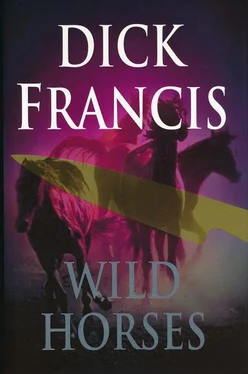‘Nothing.’
‘It’s used instead of the old plaster of Paris for fractured arms and legs. It’s rigid. It’s a polymer, actually, and porous, so you won’t itch. A knife won’t go through it.’
‘A bullet?’
‘That’s another matter.’
He worked for half an hour, during which time we discussed Dorothea and Paul, and came to no useful conclusions, though I explained how, via Bill Robinson, I was now surrounded by the army of boxes containing Valentine’s books.
At the end of Robbie’s work I was encased from chin to waist in a hard sleeveless jacket that I could take off and put on in two halves and fasten with strips of Velcro.
When I protested at its height round my neck he said merely, ‘Do you want your throat cut? Wear a polo-necked sweater. I brought you this thin white one, in case you hadn’t got one.’ He handed it over as if it were nothing.
‘Thanks, Robbie,’ I said, and he could hear I meant it.
He nodded briefly. ‘I’d better get back to my mob of coughers, or they’ll lynch me.’ He packed things away. ‘Do you think your hanged lady was lynched?’
‘No, I don’t think so.’
‘Did you trawl any useful mud with Professor Derry?’
‘The knife that bust my rib is called an Armadillo. The one with the finger holes, from the Heath, is a replica from World War One. The police had already asked the professor about it.’
‘Wow.’
‘The professor’s about eighty-five. He told me not to say wow.’
‘He sounds a riot.’
‘We got on fine, but he doesn’t know who owns the Armadillo.’
‘Take care,’ he said, leaving. ‘I’m around if you need me.’
I ate what was left of my breakfast, dressed slowly, shaved and gradually got used to living like a turtle inside a carapace.
At about the time I was ready to leave again the people at the reception desk phoned up to tell me that a young woman was asking for me. She thought I was expecting her. A Miss Lucy Wells.
‘Oh, yes.’ I’d temporarily forgotten her. ‘Please send her up.’
Lucy had come in jeans, sweater, trainers and ponytail, chiefly with the cool eighteen-year-old young lady in charge but with occasional tongue-tied lapses. She looked blankly at the multitude of boxes and wanted to know where to begin.
I gave her a lap-top computer, a notebook, a biro and a big black marker pen.
‘Give each box a big number,’ I said, writing ‘I’ with the marker pen on a microwave oven carton. ‘Empty it out. Write a list of the contents on the pad, enter the list on the little computer and then put everything back, topping each box with the list of contents. On another page, write me a general list, saying, for example, “Box I, books, biographies of owners and trainers.” OK?’
‘Yes.’
‘Shake out each book in case it has loose papers inside its pages, and don’t throw anything away, not even pointless scraps.’
‘All right.’ She seemed puzzled, but I didn’t amplify.
‘Order lunch from room service,’ I said. ‘Don’t leave any papers or books lying around when the waiter comes. OK?’
‘Yes, but why?’
‘Just do the job, Lucy. Here’s the room key for here.’ I gave it to her. ‘If you leave this room, use the key to return. When I come back I’ll bring Nash Rourke in for a drink.’
Her blue eyes widened. She wasn’t a fool. She looked at the boxes and settled for the package I’d offered.
I went back to work, driver and bodyguard giving me a lot less confidence than Delta-cast. We spent all morning in the stable yard, with Nash patiently (both in and out of character) dealing with the actors playing at police.
The initial police doubts, called for in the script, took an age to get right. ‘I don’t want these policemen to appear thick ,’ I pleaded, but it was the actors, I concluded, who were slow. I’d had no hand in casting minor characters; the trick was to make the dumbest poodle jump through the hoops.
Moncrieff swore non-stop. Nash could turn and get the light across his forehead right every time, but Nash, I reminded my fuming director of photography, wasn’t called a mega-star for nothing.
The level of muddle was not helped by the arrival of the real police asking why my fresh fingerprints were all over Dorothea’s house. We could have played it for laughs, but no one was funny. I proved to have an alibi for whenever it was that Paul had died (they wouldn’t or couldn’t say exactly when) but the stoppage ate up my lunch hour.
Back at work we progressed at length to the first arrival (by car) of Cibber, and to his planting of suspicions against Nash in the (fictional) police mind. Cibber was a good pro, but inclined still to tell inappropriate fruity jokes and waste time. ‘Sorry, sorry,’ he would breezily say, fluffing his words without remorse.
I hung on grimly to forbearance and walked twice out onto the Heath breathing deeply with sore rib twinges while Moncrieff’s men loaded the cameras for the eighth take of a fairly simple sequence. I phoned Wrigley’s garage and asked if Bill Robinson could have the afternoon off, and I spoke to Bill himself, thanking him for the second safe delivery of the boxes and asking him to open his home garage and bring bits of motorbike out onto his drive.
‘We’ve decided to film your stuff after dark,’ I said. ‘Can you spare us the evening? And will you have your big bike at home?’
Natch, fine, yes indeedy, and cor, he said.
Tired and a shade dispirited I called it a day at five-thirty in the afternoon and invited Nash to my Bedford Lodge rooms for a reviver.
‘Sure,’ he agreed easily, and greeted Lucy with enough warmth to tongue-tie her into knock knees.
‘How did you get on?’ I asked her, explaining the task briefly to Nash; and she apologised for being slow and having completed only five boxes. She had just discovered that one of the boxes held some clippings about Sonia’s death. Wasn’t that extraordinary? Box six, she said. She hadn’t had time to go through them.
‘That’s fine,’ I said. ‘Come again tomorrow, will you? Are you going right home at nights? Or perhaps staying with your Uncle Ridley?’
She made a face. ‘Not with him. Actually,’ she blushed perceptibly, ‘I’m staying here in this hotel. They had a room free and Dad agreed. I hope that’s all right?’
‘It’s splendid,’ I said moderately, knowing enthusiasm would frighten her. ‘What about Sunday, day after tomorrow?’
‘I can stay until the job’s finished,’ she said. ‘Dad said it was better.’
‘Good for Dad,’ Nash smiled.
‘He’s awfully interested,’ Lucy said, and after a pause added, ‘It’s really odd, Mr Rourke, imagining you as my dad.’
Nash smiled, the eyelids crinkling. Despite his pregnant wife, he didn’t look at all like anyone’s dad, certainly not Lucy’s.
We drank briefly together and split up, Nash yawning as he went and saying the slave-driver (T. Lyon) wanted him out working again in a couple of hours. Lucy, without making an issue of it, excused herself at the same time. Staying in the hotel, she was telling me, meant no more than convenience.
When she’d gone I looked at her master list of the boxes’ contents. Since they had been well jumbled up on the journeys, and since she had started methodically at one end, the six boxes she’d worked on held mixed and random contents.
Box I. Form books. Flat racing.
Box II. Biographies, trainers, owners and jockeys.
Box III. Form books. National Hunt racing.
Box IV. Weekly columns, Racing Gazette .
Box V. Books, annuals, racing history.
With unstoppable curiosity I knelt on the floor and opened Box III, National Hunt form books, and found that by happy chance it contained the records of two of the years when I’d been racing.
Читать дальше












